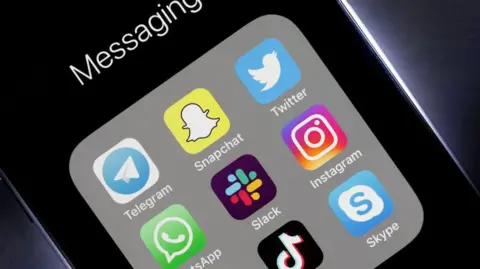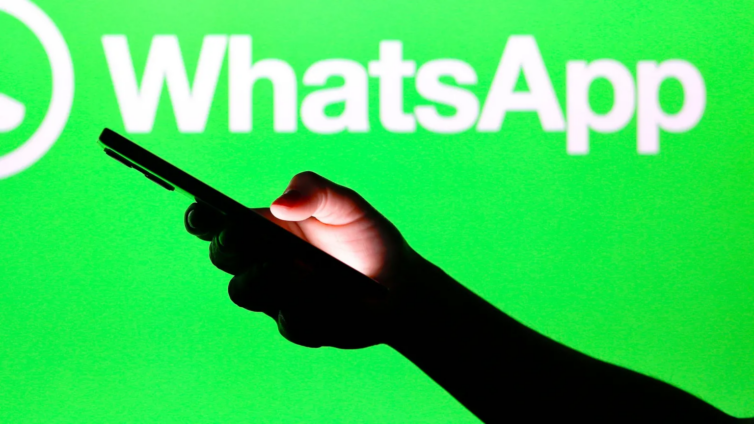In the past 24 hours, I’ve written more than 100 WhatsApp messages.
None of them were very exciting. I made plans with my family, discussed work projects with colleagues, and exchanged news and gossip with some friends.
Perhaps I need to up my game, but even my most boring messages were encrypted by default and used WhatsApp’s powerful computer servers, housed in various data centres around the world.
It’s not a cheap operation, and yet neither I nor any of the people I was chatting with yesterday, have ever parted with any cash to use it. The platform has nearly three billion users worldwide.
So how does WhatsApp – or zapzap, as it’s nicknamed in Brazil - make its money?
Admittedly, it helps that WhatsApp has a massive parent company behind it – Meta, which owns Facebook and Instagram as well.
Individual, personal WhatsApp accounts like mine are free because WhatsApp makes money from corporate customers wanting to communicate with users like me.
Since last year firms have been able to set up channels for free on Whatsapp, so they can send out messages to be read by all who choose to subscribe.
But what they pay a premium for is access to interactions with individual customers via the app, both conversational and transactional.
The UK is comparatively in its infancy here, but in the Indian city of Bangalore for example, you can now buy a bus ticket, and choose your seat, all via WhatsApp.
“Our vision, if we get all of this right, is a business and a customer should be able to get things done right in a chat thread,” says Nikila Srinivasan, vice president of business messaging at Meta.
“That means, if you want to book a ticket, if you want to initiate a return, if you want to make a payment, you should be able to do that without ever leaving your chat thread. And then just go right back to all of the other conversations in your life.”
Businesses can also now choose to pay for a link that launches a new WhatsApp chat straight from an online ad on Facebook or Instagram to a personal account. Ms Srinivasan tells me this is alone is now worth “several billions of dollars” to the tech giant.

Other messaging apps have gone down different routes.
Signal, a platform renowned for its message security protocols which have become industry-standard, is a non-profit organisation. It says it has never taken money from investors (unlike the Telegram app, which relies on them).
Instead, it runs on donations – which include a $50m (£38m) injection of cash from Brian Acton, one of the co-founders of WhatsApp, in 2018.
“Our goal is to move as close as possible to becoming fully supported by small donors, relying on a large number of modest contributions from people who care about Signal,” wrote its president Meredith Whittaker in a blog post last year.
Discord, a messaging app largely used by young gamers, has a freemium model – it is free to sign up, but additional features, including access to games, come with a price tag. It also offers a paid membership called Nitro, with benefits including high-quality video streaming and custom emojis, for a $9.99 monthly subscription.
Snap, the firm behind Snapchat, combines a number of these models. It carries ads, has 11 million paying subscribers (as of August 2024) and also sells augmented reality glasses called Snapchat Spectacles.
And it has another trick up its sleeve - according to the website Forbes, between 2016 and 2023 the firm made nearly $300m from interest alone. But Snap’s main source of revenue is from advertising, which brings in more than $4bn a year.

The UK-based firm Element charges governments and large organisations to use its secure messaging system. Its customers use its tech but run it themselves, on their own private servers. The 10-year old firm is in “double digit million revenue” and “close to profitability”, its co-founder Matthew Hodgson tells me.
He believes the most popular business model for messaging apps remains that perennial digital favourite - advertising.
“Basically [many messaging platforms] sell adverts by monitoring what people do, who they talk to, and then targeting them with the best adverts,” he says.
The idea is that even if there is encryption and anonymity in place, the apps don’t need to see the actual content of the messages being shared to work out a lot about their users, and they can then use that data to sell ads.
“It's the old story - if you the user, aren't paying, then the chances are that you are the product,” adds Mr Hodgson.
Latest Stories
-
Take politics out of anti-corruption institutions – Dr Oduro Osae
23 minutes -
President Mahama hails Black Star Marathon as key to Ghana’s tourism growth
41 minutes -
Ghanaian community in Côte d’Ivoire pushes for Chamber of Commerce to boost cross-border trade
1 hour -
The Joshua of Our Time: Why Dr Bryan Acheampong is the right leader to guide the NPP into its promised future
1 hour -
Public Financial Management Act must be enforced – Yaw Appiah Lartey on damning Auditor‑General’s findings
1 hour -
Absa Bank Ghana hosts Youth Festival to empower young entrepreneurs
1 hour -
WPRD Festival 2025 closes with PR fireside chat on leadership
1 hour -
Afrofuture and WatsUp TV launch nationwide Rising Star Challenge on university campuses
2 hours -
Auditor-General report: Heads must roll among technical officers, not just politicians – Dr. Eric Oduro Osae
2 hours -
Ghana must rethink internal audit to defeat corruption
2 hours -
CIMG engages BoG to deepen collaborations
2 hours -
Hey big spenders – Liverpool lead top-four domination of £1bn deals
2 hours -
UK-Ghana industrial ties celebrated as British High Commissioner visits Springs and Bolts factory
2 hours -
Discontinuation of UniBank case: Adongo calls for national discourse
2 hours -
uniBank case: The decision creates avenue to loot – Kwadwo Poku criticises AG’s move to drop Duffuor case
2 hours

